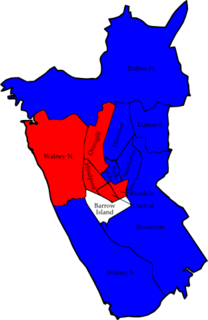Related Research Articles

Barrow-in-Furness is a local government district with borough status in Cumbria, England. It is named after its main town, Barrow-in-Furness. Other settlements include Dalton-in-Furness and Askam-in-Furness. It is the smallest district in the county, but is the most densely populated, with 924 people per square kilometre. The population was 71,980 in 2001, reducing to 69,087 at the 2011 Census.

Barrow and Furness is a constituency in Cumbria represented in the House of Commons of the UK Parliament since 2010 by John Woodcock. On 30 April 2018, he was suspended from the Labour Party following a sexual harassment allegation made against him. On 18 July 2018, Woodcock resigned from Labour and now sits as an Independent MP.
Barrow-in-Furness Borough Council in Cumbria, England is elected every 4 years. This was changed in 2011 from the previous situation where one third of the council was elected each year, followed by one year where there was an election to Cumbria County Council instead.
The People's Party or Socialist People's Party was a minor political party in the Furness region of England.
Albert Edward Booth was a British left-wing Labour Party politician.
The 2003 South Lakeland District Council election took place on 1 May 2003 to elect members of South Lakeland District Council in Cumbria, England. One third of the council was up for election and the council stayed under no overall control.
Elections to Barrow-in-Furness Borough Council were held on 7 May 1998. One third of the council was up for election and the Labour party stayed in overall control of the council.
Elections to Barrow-in-Furness Borough Council were held on 6 May 1999. The whole council was up for election with boundary changes since the last election in 1998. The Labour party lost overall control of the council to no overall control.
The 2000 Barrow-in-Furness Borough Council election took place on 4 May 2000 to elect members of Barrow-in-Furness Borough Council in Cumbria, England. One third of the council was up for election and the council stayed under no overall control.
Elections to Barrow-in-Furness Borough Council were held on 2 May 2002. One third of the council was up for election and the council stayed under no overall control.
Elections to Barrow-in-Furness Borough Council were held on 10 June 2004. One third of the council was up for election and the Labour party kept overall control of the council.

Elections to Barrow-in-Furness Borough Council were held on 4 May 2006. One third of the council was up for election and the Labour party lost overall control of the council to no overall control.

Elections to Barrow-in-Furness Borough Council were held on 3 May 2007. One third of the council was up for election and the council stayed under no overall control.

Elections to Barrow-in-Furness Borough Council was held on 1 May 2008. The whole of the council was up for election, with the number of councillors falling from 38 to 36, as a result of ward boundary changes enacted in February 2008. Councillors were elected for terms ranging between two and four years; where more than one councillor was elected in a ward, the councillor with the highest number of votes was granted the longer term.

Cumbria County Council is the county council of Cumbria, a county in the North West of England. Established in 1974, following its first elections held a year before that, it is an elected local government body responsible for the most significant local services in the county, including county schools, county roads, and social services.

Local elections were held in the United Kingdom on 3 May 1979. The results provided some source of comfort to the Labour Party (UK), who recovered some lost ground from local election reversals in previous years, despite losing the general election to the Conservative Party on the same day.

The 2010 Barrow-in-Furness Borough Council election took place on 6 May 2010 to elect members of Barrow-in-Furness Borough Council in Cumbria, England. One third of the council was up for election and the council stayed under no overall control.

The 2011 Barrow-in-Furness Borough Council election took place on 5 May 2011 to elect members of Barrow-in-Furness Borough Council in Cumbria, England. The whole council was up for election and the Labour party gained overall control of the council from no overall control.

The 2011 South Lakeland District Council election took place on 5 May 2011 to elect members of South Lakeland District Council in Cumbria, England. One third of the council was up for election and the Liberal Democrats stayed in overall control of the council.
The 2015 Barrow-in-Furness Borough Council election took place on 7 May 2015 to elect members of Barrow-in-Furness Borough Council in England. This was on the same day as other local elections.